AI is a gift. Don’t listen to the alarmists.
Yes, big leaps in innovation can be scary. It’s often change we fear more than the technology itself, particularly as we get older – and particularly when they’ve been making movies about Skynet since the early ‘80s.
Don’t get me wrong. We should definitely have reasonable safeguards and regulations to protect us from the unknown. That’s not about the science. It’s about the people who push the buttons.
Artificial virtue is infinitely more dangerous than artificial intelligence.
You may have seen the press we got this week for our own little AI story. It wasn’t hypothetical or frivolous. It was about real, meaningful outcomes.
We didn’t cure cancer or solve world hunger. But we did double the number of people whose voices are heard through our polls and made work significantly more rewarding for the people on our team. That’s something.
After months of development and testing, we unleashed ChatGPT to draft upwards of 20,000 new poll questions, per day, about everything – and I mean everything – in the news. The number of respondents who engage with us doubled from 500,000 to 1 million. The total answers we collected jumped from an average of 3 million, daily, to a high of 6.5 million. It’s enabling more people, from all backgrounds and walks of life, to weigh in on the things that matter most to them – so people like you can make their world better.
And nobody at CivicScience is losing a job. On the contrary.
In the before times, our team of professional writers worked around the clock, authoring new questions about the topics of the day. It was a grinding and often depressing task – you try reading catastrophized news, 24/7, and see how you feel by dinnertime. Now, serving as ChatGPT editors and algorithm-trainers, their question-management time is cut in half, freeing them up to do more valuable – and gratifying – analysis and writing.
If done right, AI will only elevate human expertise, not replace it. Will jobs change? For sure. But, only for the better in the long run, presuming you generally care about the people you employ or educate.
And that brings me back to virtue. Slowing down or constraining a life-altering technology like AI would be a mistake – if only because the bad people aren’t slowing down.
We don’t need to be afraid of them.
We just need to beat them.
Here’s what we’re seeing:
Consumer confidence is okay. After nearing the gutter at the beginning of April, our Economic Sentiment Index has its second consecutive positive reading this week, albeit a modest one. Optimism for the housing market, job market, and personal finances all increased slightly, while the longer-term outlook for the economy and confidence in making major purchases fell. Barring any unforeseen catastrophes in the coming weeks (knock on wood), I’ll bet you the numbers continue to improve heading into the summer.
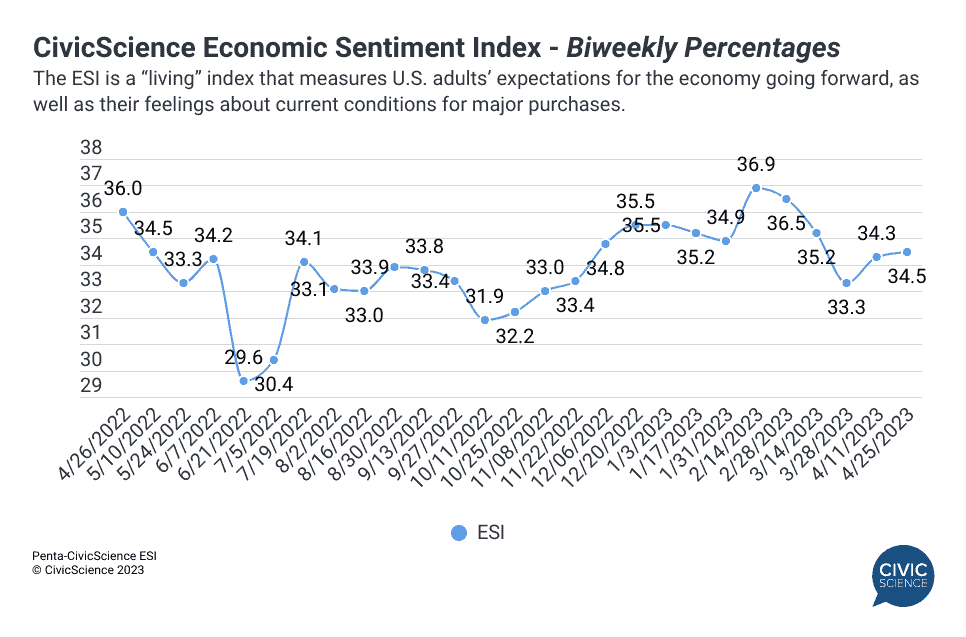
Financial literacy in America is stagnant. The percentage of U.S. adults who consider themselves to be financially literate has remained remarkably steady over the past three years, with just under one-third saying they’re “very” literate. Notably, younger Millennials (25-34yo) are the most likely to feel very confident in their financial literacy, which is interesting because they’re also the group most likely to say they feel financially insecure. There are expected (if disappointing) variances by gender and income. People who learned financial literacy skills in the workplace report the most confidence about it. K-12 schools are failing in this area. Don’t get me started.
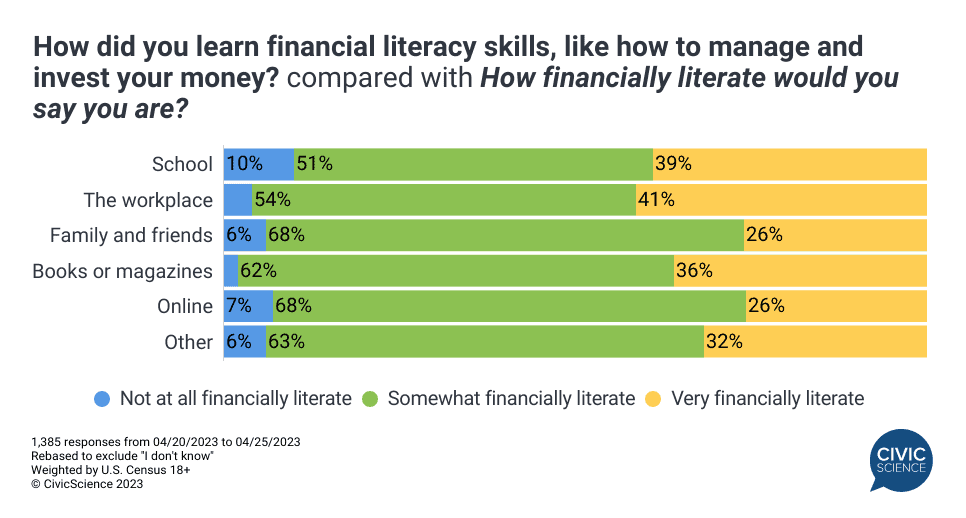
Tighter regulations would bring a lot more people into the crypto market. Support for greater government oversight and regulation of cryptocurrency has gained significantly among investors (up to 46% from 38%) since we last published data on the subject in January. The eye-popping number, though, is the increase in regulatory support among crypto intenders (i.e. people who are thinking about jumping in), which climbed from 24% four months ago to 44% this week. While Coinbase is the leading trading platform, by a hair, snagging these potential new investors is anyone’s game – although Crypto.com doesn’t seem to have parlayed those stadium naming rights into superior market share.
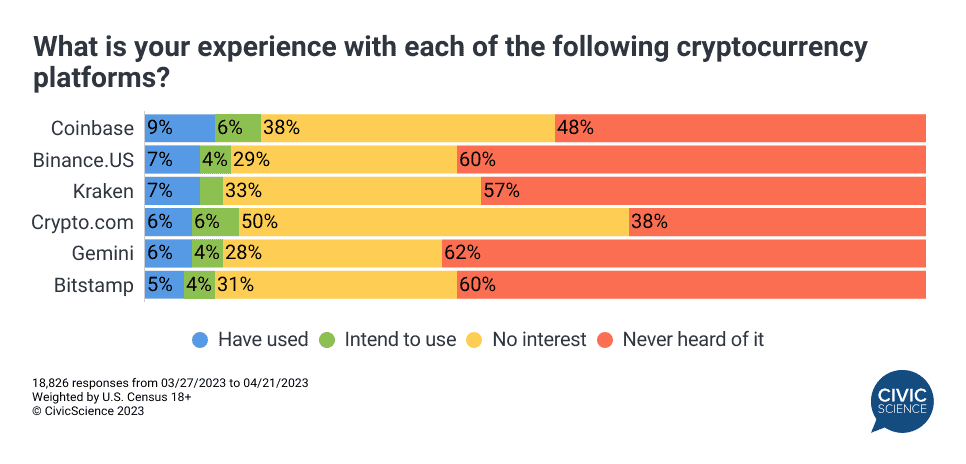
Tucker Carlson is a much bigger lightning rod than Don Lemon. Well, it was certainly an amusing week on the cable news front. Don Lemon and Tucker Carlson getting canned within hours of each other was almost the stuff of conspiracy theories. Data we published the following morning revealed that the two moves will likely have different impacts. A full third of Fox viewers say they are less likely to tune into the network, while 15% of the Gen Pop say they’re more likely to watch now. On the other (left) side, 22% of CNN fans say they’ll watch the network less and 16% of the Gen Pop say they’re more inclined. That said, Tucker is far more likely to carry his fans with him.
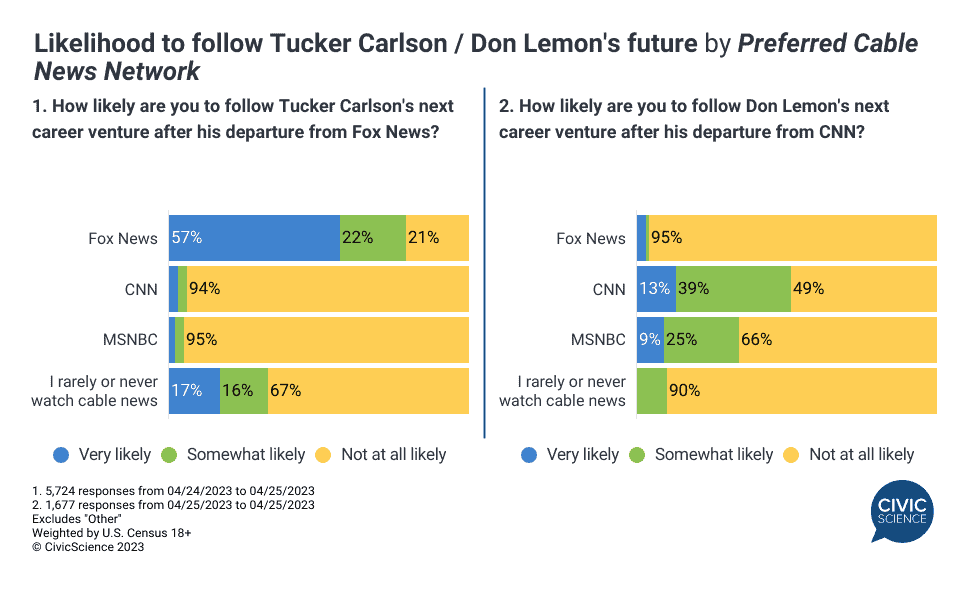
Consumers are tipping more compared to last year, but not recycling as much as they should. In our 3 Things to Know this week, we looked at air travel, tipping, and recycling. In short, a majority of Americans are still hesitant about flying (largely due to cost). Conversely, 40% say they are tipping service industry workers more than they did last year – perhaps because tipping has been more institutionalized, everywhere, or because 20+% of inflation-inflated bills is just more. Meanwhile, we apparently make it really hard for people to recycle.
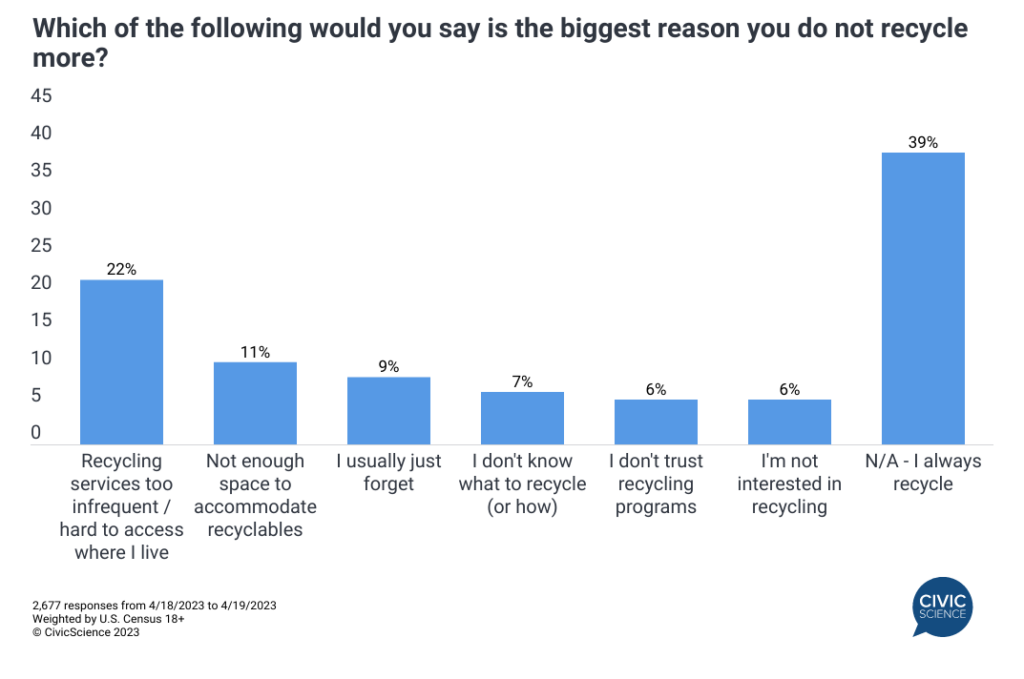
We should just let Amazon or McDonald’s run government services. I dusted off my podcast equipment this week to visit with Diego Piacentini, who spearheaded technology initiatives for the Italian government, after a 16-year stint as one of Amazon’s earliest execs. We talked about the challenges of innovation in large, legacy organizations and how the only way to fix government is from the bottom up – which is exactly the opposite of what’s happening today. It’s a great listen.
Nostalgia is still all the rage. There are so many fascinating factors driving this trend – from our post-COVID lust for physical and emotional comfort to the uncanny predictive power of Neil Howe and Bill Strauss’s generational cohort theory (read it, if you haven’t – it will fundamentally alter the way you see the world). Anyway, 43% of U.S. adults say nostalgia is a factor in their fashion choices, up 3 points from last year. Casual sneakers top the list of popular items and wide-legged jeans are on the rise, while skinny jeans are fading into oblivion (thank God).
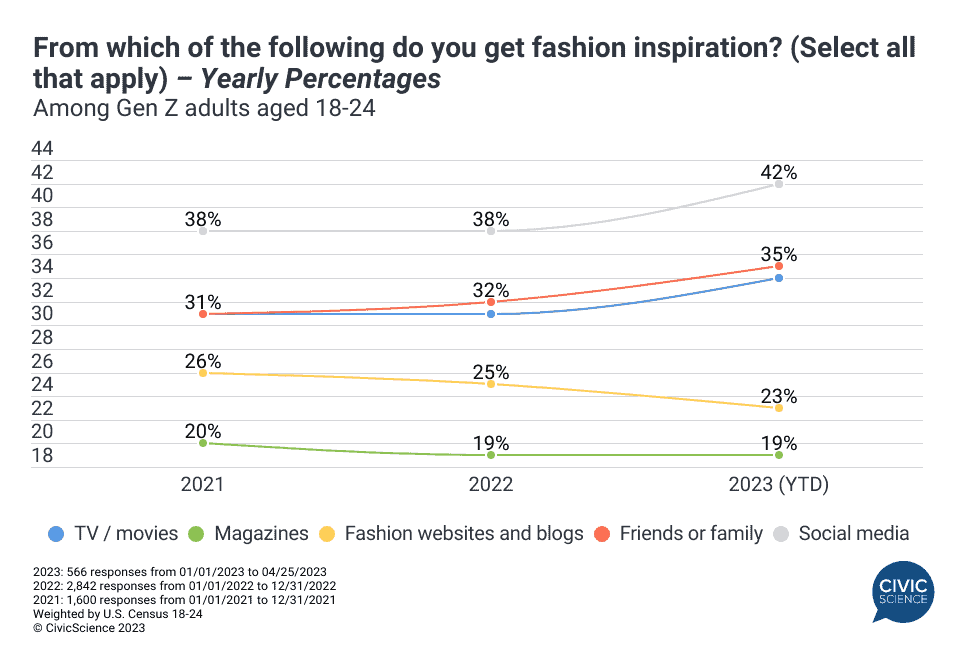
More awesomeness from the InsightStore this week:
- Speaking of nostalgia, a surprising number of people would like to see an old-timey video store return to their neighborhood;
- And speaking of casual sneakers, we looked at the big differences between fans of the two trendiest DTC brands, Rothy’s and Allbirds;
- Fewer people will be spending on Mom for Mother’s Day this year, which is dumb;
- Retail loyalty members are more likely to be cord-cutters plus other insights you probably didn’t know.
The most popular (machine-aided) questions this week:
- Do you think it’s okay to leave Christmas lights up for the entire year?
- Do you think it’s reasonable or unreasonable to plan your vacation around a potential playoff run for your favorite pro sports team?
- Can you tell if someone could become a longtime friend after meeting them once?
- Where’s your preferred home parking spot?
- Do you think movie theaters should commonly offer an intermission?
Answer Key: To each their own; Very reasonable; No but I can tell if they won’t; Garage in the winter, driveway in the summer; No way – Actually, yes, especially if they serve cocktails.
Hoping you’re well.
JD








